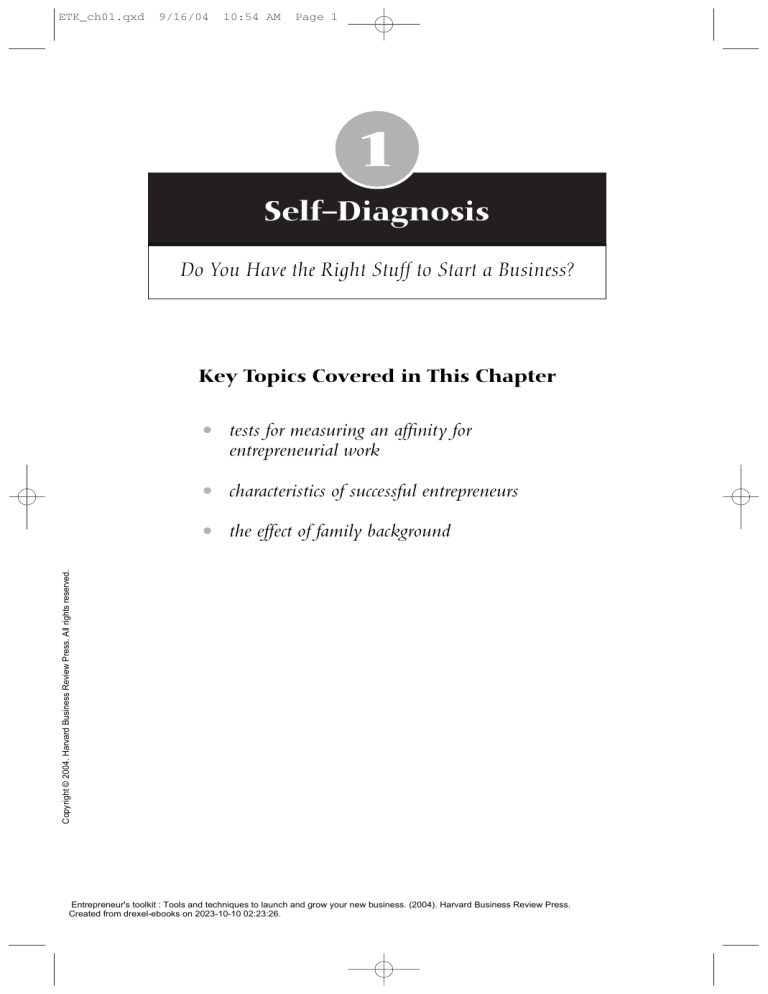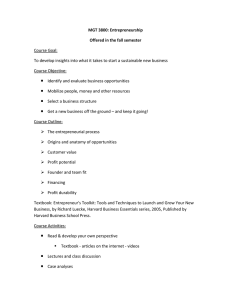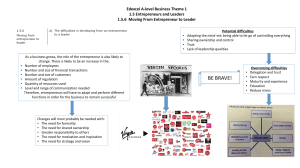
ETK_ch01.qxd 9/16/04 10:54 AM Page 1 1 Self-Diagnosis Do You Have the Right Stuff to Start a Business? Key Topics Covered in This Chapter • tests for measuring an affinity for entrepreneurial work • • characteristics of successful entrepreneurs Copyright © 2004. Harvard Business Review Press. All rights reserved. the effect of family background Entrepreneur's toolkit : Tools and techniques to launch and grow your new business. (2004). Harvard Business Review Press. Created from drexel-ebooks on 2023-10-10 02:23:26. ETK_ch01.qxd 9/16/04 10:54 AM Page 2 Copyright © 2004. Harvard Business Review Press. All rights reserved. F e w e n t r e p r e n e u r s i n v e n t things that change the way millions of people live or work. Dan Bricklin is an exception. In 1979, he and Bob Frankston created the first killer app of the personal computer age: an electronic spreadsheet they called VisiCalc. They formed a company to perfect and market this software, which, along with word processing programs, did more than almost anything else to fuel the growth of the personal computer industry. As if to demonstrate that even a great invention is no assurance of commercial success, Bricklin’s company, Software Arts, went belly-up. Its assets had to be sold to Lotus Development to avoid bankruptcy. But like many entrepreneurs, Bricklin went on to start other ventures. He became a serial entrepreneur, participating in four start-ups. What is unique about people like Bricklin? What makes them tick? What are the personal traits and backgrounds of people who become successful entrepreneurs? This chapter addresses those questions and helps you determine whether you have the right stuff to be a business entrepreneur. The Makings of an Entrepreneur Many books and Web sites provide self-scoring tests that people can use to assess their fitness for entrepreneurial life. Here are some of the usual questions: Can you tolerate a high level of risk? Are you an overachiever? Entrepreneur's toolkit : Tools and techniques to launch and grow your new business. (2004). Harvard Business Review Press. Created from drexel-ebooks on 2023-10-10 02:23:26. ETK_ch01.qxd 9/16/04 10:54 AM Page 3 Self-Diagnosis 3 Are you willing to put in ten- to twelve-hour days over an extended period, including weekends, to reach your goals? Are you a self-starter? Would you describe yourself as a good decision maker? Are you willing to put your personal funds at risk? Copyright © 2004. Harvard Business Review Press. All rights reserved. Do you have the commitment required to build a business in the face of long hours and modest odds of success? Such questions help people think through the personal side of entrepreneurial work and their fitness for it. This thought process is especially important for the would-be business owner who says, “I have a great idea for a business.” Ideas are important, but rarely are they as important as personal background, motivation, and attitude. So take one or two of these self-tests and use the results to think deeply about your suitability for starting and operating an enterprise. (The U.S. Small Business Administration provides one on its site, www.sba.gov.) Take these tests, but don’t rely exclusively on their results because few of them are empirically based. Also, individual differences cannot be captured in a test. As scholar and practitioner William Bygrave has written, “Today, after more research, we know that there is no neat set of behavioral attributes that allow us to separate entrepreneurs from nonentrepreneurs.”1 One of the few thorough studies on entrepreneurial characteristics was conducted between 1987 and 2002 by Walter Kuemmerle, an associate professor at Harvard Business School, who examined more than fifty start-up enterprises in twenty countries and across all industries. Some were successful; others were not. From this mixed bag Kuemmerle distilled five characteristics of successful entrepreneurs, a list he views as a litmus test for people who want to start their own businesses. He found that those characteristics are firm across industries and countries. Successful entrepreneurs, according to Kuemmerle, 1. are comfortable stretching the rules 2. are prepared to make powerful enemies Entrepreneur's toolkit : Tools and techniques to launch and grow your new business. (2004). Harvard Business Review Press. Created from drexel-ebooks on 2023-10-10 02:23:26. ETK_ch01.qxd 9/16/04 4 10:54 AM Page 4 Entrepreneur’s Toolkit 3. have the patience to start small 4. are willing to change strategy quickly 5. know how to close a deal2 Let’s consider each of these characteristics in some detail. Copyright © 2004. Harvard Business Review Press. All rights reserved. Comfortable Stretching the Rules Successful entrepreneurs are willing to bend the rules to get what they need: capital, able employees, contracts, or whatever it takes to achieve their ends. In a Harvard Business Review article on this subject Kuemmerle cites the example of a two-person direct-marketing startup that, with venture capital money in hand, desperately needed to hire two dozen experienced marketers—and quickly. But what topnotch people would leave their jobs to join a company that didn’t even have an office (the two principals were still working out of their homes)? To get over this problem, the entrepreneurs placed a sizable ad in a major business paper that described their little outfit as a “fast growing multinational company.” Then they rented a plush office suite at a fashionable Four Seasons hotel for the day as an interviewing site. Per Kuemmerle, more than one thousand people responded. These owners got what they wanted by stretching the rules—and the truth. Prepared to Make Powerful Enemies It’s always smart to pursue opportunities that will not put you in competition with a powerful rival—a big, entrenched company that has many resources. But this is not always possible. Entrepreneurs will not seek out a David and Goliath situation, but neither will they shrink from it. Michael Dell, for example, went up against IBM and other big personal computer makers when he began his fledgling company. But he did so with a twist: direct-to-consumer sales. Sam Walton did the same thing when he opened the first Wal-Mart store in Rogers, Arkansas, in 1962. He faced formidable competition from Sears, Kmart, and other mass-market merchandisers. So he Entrepreneur's toolkit : Tools and techniques to launch and grow your new business. (2004). Harvard Business Review Press. Created from drexel-ebooks on 2023-10-10 02:23:26. ETK_ch01.qxd 9/16/04 10:54 AM Page 5 Self-Diagnosis 5 challenged them indirectly, by locating his stores in small, rural communities that were unserved by the mega-retailers. Forty-two years later, the company Walton founded led the list of Fortune 500 companies, with revenues of $259 billion. Copyright © 2004. Harvard Business Review Press. All rights reserved. Have the Patience to Start Small Most new ventures, no matter how well planned, are experiments. Starting small gives company founders an opportunity to test and fine-tune a commercial concept before they roll it out in a major way—that is, before they lock themselves into a business formula. Starting small gives them a chance to sense how customers respond to a product, its price, and the way it is served. Perhaps the most spectacular and financially catastrophic start-up failure of the past ten years resulted from a start-up company whose leaders were unwilling to start small. This case involved Webvan, whose founders—including Louis Borders, founder of Borders Group—envisioned a nationwide system of grocery home-delivery. Webvan began by building a monster 330,000-square-foot automated warehouse in Oakland, California. It then raised more than $850 million in equity capital and began work on twenty-six similar facilities in metropolitan areas across the United States. But the company never came close to breaking even. Within two years it had burned through its cash and was forced into bankruptcy. By most estimates, Webvan had tried to do too much too fast. By 2002, Louis Borders was back with a new venture, KeepMedia, which allowed Internet users to download articles from hundreds of periodicals on a pay-for-use basis. But he seemed to have learned the lesson of starting small. His new venture was more modest—with thirty-two employees versus the five thousand on the rolls of Webvan—and aimed to grow more slowly. Willing to Shift Strategies Quickly The future never unfolds as we expect it to. Customer requirements change. Competitors respond to our initiatives with unanticipated Entrepreneur's toolkit : Tools and techniques to launch and grow your new business. (2004). Harvard Business Review Press. Created from drexel-ebooks on 2023-10-10 02:23:26. ETK_ch01.qxd 9/16/04 6 10:54 AM Page 6 Entrepreneur’s Toolkit changes in price, products, and incentives. New opportunities and new markets for products appear out of nowhere. Thus, the fledgling company that sticks stubbornly to its initial strategy will find itself in trouble. “Smart entrepreneurs,” says Kuemmerle, “recognize that a new venture gains credibility more by simply surviving than by doggedly following its original strategy. They are quick to recognize when they have to change course, and they seldom hesitate to do so.”3 Copyright © 2004. Harvard Business Review Press. All rights reserved. Know How to Close a Deal Successful entrepreneurs, says Kuemmerle, understand how to seal a deal. “However tough the market or small the transaction, they know exactly what they must give up—and what they can get away with—while finalizing deals under pressure.”4 Compared with established corporate managers, the entrepreneur deal maker must be comfortable with risk and must not be intimidated by a shortage of information. Unlike their corporate counterparts, entrepreneurs are much more likely to find themselves in situations in which making a sale, landing a contract, or reaching agreement with a lender means the difference between survival and bankruptcy. They are so close to the edge of failure that every deal has major consequences. Whereas the corporate manager will say, “I’d like more information before I make a decision or make a deal,” the entrepreneur must make the best of uncertainty and press forward. Standing still and waiting for more information is less often an option. Give some thought to where you stand in terms of these entrepreneurial characteristics. Are you comfortable stretching the rules? Are you willing to go up against powerful competitors if necessary? Are you prepared to start small and see how the game plays out before going full speed ahead? If your initial plan runs into a brick wall, are you sufficiently flexible and humble to say, “This isn’t working; I need to try something else”? Are you the kind of person who recognizes what must be done—and then does it? If you answered yes to these questions, it’s likely that you’re entrepreneurial material. If you answered no to more than one, consider how that response could hold you back. Entrepreneur's toolkit : Tools and techniques to launch and grow your new business. (2004). Harvard Business Review Press. Created from drexel-ebooks on 2023-10-10 02:23:26. ETK_ch01.qxd 9/16/04 10:54 AM Page 7 Self-Diagnosis 7 Other Valuable Traits Kuemmerle’s list of personal qualities should be included in every self-diagnosis. But there are others to consider. Entrepreneurs should bring other qualities to the venture: • Negotiating skills • Technical skills • The ability to sell their vision to others, including employees and capital providers • The ability to motivate employees and delegate work to them • A knack for turning plans into action—that is, the ability to execute Copyright © 2004. Harvard Business Review Press. All rights reserved. • A passion for what they are doing Of those, the last may be the most important, because passion can sustain a person through the long hours and inevitable disappointments that are part of every start-up venture. As Sam Walton used to tell people, “I think I overcame every single one of my personal shortcomings by the sheer passion I brought to my work. I don’t know if you’re born with this kind of passion, or if you can learn it. But I do know you need it. If you love your work, you’ll be out there every day trying to do it the best you possibly can, and pretty soon everybody around will catch the passion from you—like a fever.” source: Wal-Mart Web site, <www.walmartstores.com/Home Page/About Wal-Mart/The Wal-Mart Culture/Sam’s Rules For Building A Business> (accessed 23 March 2004). Background Entrepreneurship runs in families to a surprising degree. Children of business owners are more likely than others to start or purchase their own enterprises. Similarly, anecdotal data indicates that children of business-owning parents are more likely than others to Entrepreneur's toolkit : Tools and techniques to launch and grow your new business. (2004). Harvard Business Review Press. Created from drexel-ebooks on 2023-10-10 02:23:26. ETK_ch01.qxd 9/16/04 8 10:54 AM Page 8 Entrepreneur’s Toolkit Copyright © 2004. Harvard Business Review Press. All rights reserved. enroll in the entrepreneurship courses offered by undergraduate and M.B.A. programs. This should not be surprising. The challenges, the joys, the difficult choices, and the rewards of business ownership are frequent topics of discussion around the dinner tables of business-owning families. The children learn the “what” and “how” of enterprise ownership from these discussions and from many weekends and summers working in the family store or factory. Indeed, Paul Newman, whom most think of simply as an accomplished actor, grew up in a business-owning family and has recounted in interviews the many childhood weekends he spent in his father’s store. Those experiences surely had something to do with his founding of Newman’s Own, a packaged food products company whose profits are donated to charity. Jim Koch, founder and chairman of Boston Beer Company, represents the sixth generation of brewing in his family. Similarly, Dan Bricklin came from a family that owned and ran its own business, and that background surely influenced the future course of his life: My father headed up the family printing business, Bricklin Press, which had been founded by his father in the 1930s.Afternoons spent at the printing plant and dinners devoted to the day’s business problems prepared me . . . for the trials I would face in my own business ventures. . . . Growing up, I never expected that some big company would eventually take care of me; instead, I was always looking for opportunities to turn some nifty ideas into a business.5 It May Be Right for You No matter what your background, an entrepreneurial venture may be right for you. Successful enterprise is a combination of personal qualities and quality planning. You don’t have to be a genius with a killer idea: Most successful start-ups begin with incremental innovations. You don’t have to be totally fearless: Entrepreneurs who prosper have a healthy aversion to risk. Nor is technical business know-how essential: You can learn as you go along or enlist an ex- Entrepreneur's toolkit : Tools and techniques to launch and grow your new business. (2004). Harvard Business Review Press. Created from drexel-ebooks on 2023-10-10 02:23:26. ETK_ch01.qxd 9/16/04 10:54 AM Page 9 Self-Diagnosis 9 perienced business person as a co-owner. An individual who has all the right qualities for entrepreneurial work but a poor plan will not succeed. Nor will a person with a great plan but weak motivation and a terror of uncertainty. What you must have is a solid plan, the ability to execute it, and a high degree of motivation—motivation that makes business success an important personal goal. Do you have these qualities? Summing Up • Ideas are an important element of success for entrepreneurs, but they’re not as important as personal background, motivation, and attitude. Copyright © 2004. Harvard Business Review Press. All rights reserved. • Tests have been designed to measure a person’s suitability for an entrepreneurial life, but these tests should be used only as a rough gauge. • One researcher believes that the following traits are essential for entrepreneurial success: comfort in stretching the rules; being prepared to make powerful enemies; having the patience to start small; a willingness to change strategy quickly; and knowing how to close a deal. • Entrepreneurship runs in families. Children of business owners are more likely than others to start or purchase their own enterprises. Entrepreneur's toolkit : Tools and techniques to launch and grow your new business. (2004). Harvard Business Review Press. Created from drexel-ebooks on 2023-10-10 02:23:26. 9/16/04 10:54 AM Page 10 Copyright © 2004. Harvard Business Review Press. All rights reserved. ETK_ch01.qxd Entrepreneur's toolkit : Tools and techniques to launch and grow your new business. (2004). Harvard Business Review Press. Created from drexel-ebooks on 2023-10-10 02:23:26.


